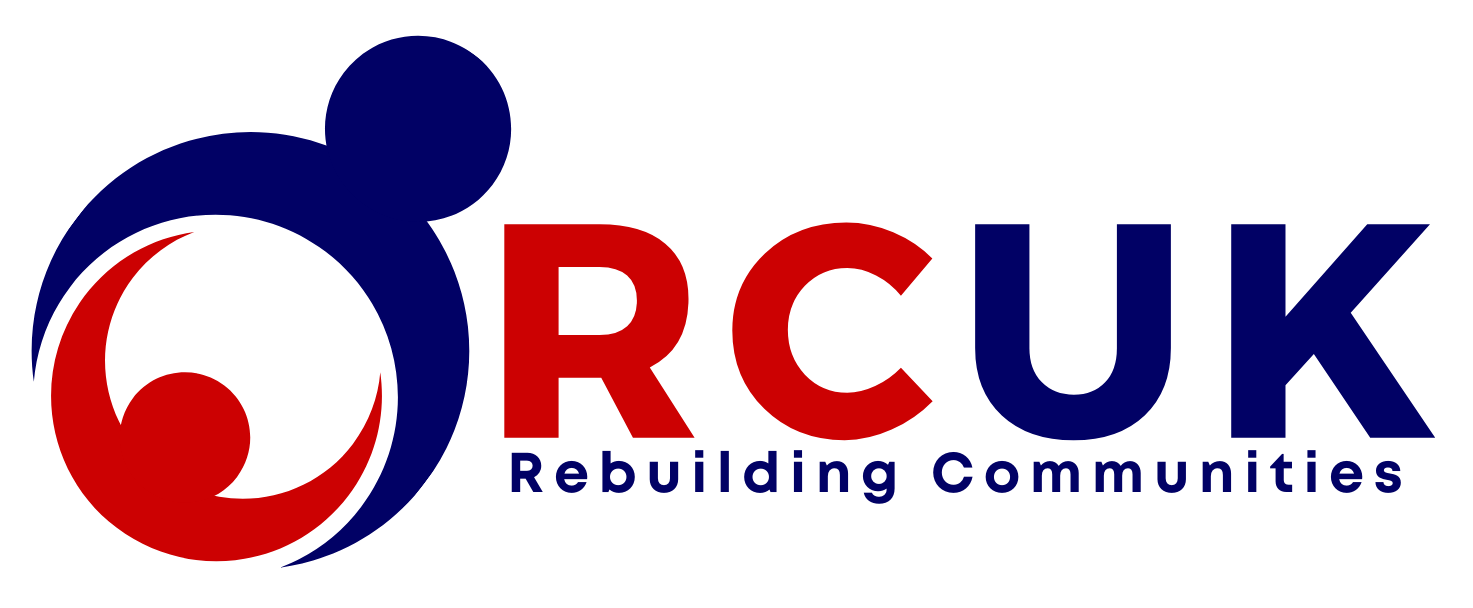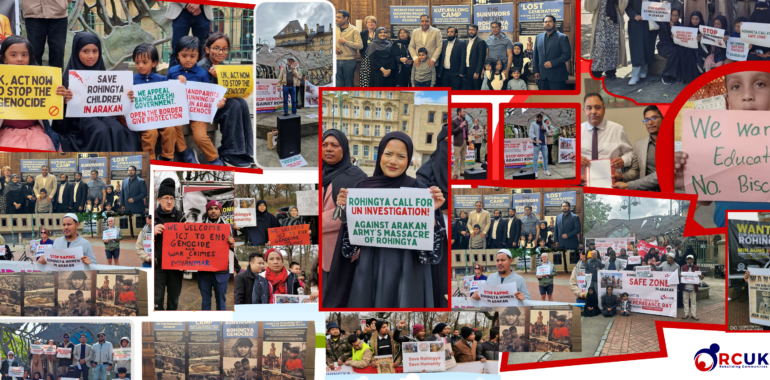Overview:
Over one million Rohingya, a Muslim minority from Arakan (Rakhine) State in Myanmar, have been forced to flee their homeland due to decades of violence and persecution.
The most devastating exodus occurred in August 2017, when 745,000 Rohingya were driven out by brutal military operations, seeking refuge in neighbouring Bangladesh.
These new arrivals joined around 300,000 Rohingya who had already fled earlier waves of violence in 1978-2016.
Today, the region is home to approximately 1.5 million Rohingya refugees who remain completely dependent on humanitarian aid for survival, including protection, food, water, shelter, education, and healthcare.
In addition, thousands more have sought refuge in neighbouring countries, and more than 600,000 Rohingya are internally displaced within Myanmar.
Who are the Rohingya?
The Rohingya are a nation with a deep connection to the land of Arakan in Myanmar. For centuries, they have lived on this soil, cultivating their culture, traditions, and way of life. Arakan, once an independent kingdom, has always been the heart of the Rohingya community. But their story, once intertwined with the land, has become one marked by hardship, displacement, and loss.
When Burma (now Myanmar) gained independence from British rule on 4 January 1948, Arakan was absorbed into the new nation. In the years that followed, the Rohingya, long regarded as an integral part of the region, began to face increasing hostility from the state since 1962.
They were stripped of their citizenship through the 1982 Citizenship Law, leaving them stateless. What followed was a gradual erosion of their rights and freedoms, as they were systematically excluded, marginalised, and persecuted.
For decades, the Rohingya lived without legal protection. Their identity was erased, and their dignity was denied. Vulnerable and without the means to protect themselves, they became targets of atrocities unimaginable in their severity. The world has witnessed the horrors inflicted upon them—crimes against humanity, including widespread sexual violence and gang rapes, forced displacement, ethnic cleansing, and even genocide. Their homes were burned, their families torn apart, and their hopes shattered.
What is the crisis about?
The crisis affecting the Rohingya is rooted in a long history of systematic discrimination, persecution, and violence. Over the years, Myanmar’s government, and particularly its military, have regarded the Rohingya as “foreigners,” despite their centuries-long presence in the country. This perception has led to the Rohingya being subjected to forced labour, restrictions on movement, arbitrary arrests, land seizures, and various forms of human rights violations.
The situation reached a breaking point in August 2017 when the Myanmar military launched a brutal crackdown in Arakan State. The United Nations and human rights organisations have condemned these actions as ethnic cleansing and genocide.
The Rohingya crisis is not just a humanitarian issue, but a deeply political and human rights issue. The Rohingya have been systematically denied their basic rights, forced to live as refugees in overcrowded camps, and subjected to repeated waves of violence. The ongoing crisis is a result of Myanmar’s refusal to recognise the Rohingya as citizens, and the international community’s struggle to address the root causes of their persecution.
This crisis is about the Rohingya’s right to live with dignity and security in the land they have always called home, free from violence, discrimination, and the threat of further atrocities. The world must not forget their struggle for justice, recognition, and the restoration of their basic rights.
Cox’s Bazar – the largest refugee settlement in the world:
The majority of Rohingya refugees live in 33 camps in Cox’s Bazar, the largest refugee settlement in the world. Overcrowded and dire conditions, especially for women and children, expose them to high risks of violence, exploitation, and trafficking.
Natural disasters like floods and landslides during the monsoon season further threaten their safety, compounded by inadequate water and sanitation facilities that increase the risk of waterborne diseases such as hepatitis, acute diarrhoea, and dengue.
In addition to these hazards, the camps frequently experience fire incidents that cause significant damage to shelters and infrastructure, leading to the tragic loss of lives. The emotional toll on survivors is profound, with many lefts to cope with the trauma of losing their homes and loved ones. Limited fire-fighting resources and response capacity worsen the situation, leaving families vulnerable to repeated destruction and loss.
The ongoing cycle of violence, destruction, and trauma continues to devastate the Rohingya people, deepening the challenges they face in their struggle for safety, dignity, and a future free from fear.
Humanitarian challenges in Arakan:
Since October 2023, clashes between the Myanmar military and armed opposition factions have intensified, spreading throughout the country, and escalating the human rights emergency. The military’s actions, including the targeting of civilians and forced recruitment campaigns, have resulted in widespread displacement, with over 2.8 million people displaced nationwide.
In Arakan State, the escalation of violence has reached a new peak, with the Arakan Army, a separatist group, now controlling large portions of the region. This shift in power dynamics has exacerbated vulnerabilities, with the Rohingya continuing to face systemic persecution amidst ongoing violence. The situation has intensified the challenges for displaced populations and created an even more complex humanitarian landscape.
The humanitarian situation in Arakan remains critical, with escalating violence, displacement, and continued persecution of the Rohingya and other ethnic minorities.
How is the crisis affecting children?
Rohingya children in both Myanmar and refugee camps in neighbouring countries face confinement and isolation due to ongoing violence, forced displacement, and severe restrictions on their movement. In Arakan State, where many Rohingya children continue to live, they are trapped in a cycle of fear and deprivation, with limited access to essential services, including healthcare and education.
The trauma experienced by Rohingya children and youth are profound. They are at significant risk of forced recruitment by armed groups, while many suffer from severe mental distress due to witnessing violence and losing family members. In refugee camps, many children grow up in overcrowded and hazardous conditions, where their fundamental rights to safety, education, and healthcare remain unmet.
Until conditions in Myanmar improve, allowing the safe return of Rohingya families with full citizenship rights, protection from violence, and access to basic services, these children will remain in limbo—either as refugees or internally displaced persons. Their future remains uncertain, yet their resilience is undeniable as they continue to endure unimaginable hardships.
RCUK involvement and our role:
RCUK has been at the forefront of advocating for the human rights and justice of the Rohingya people, amplifying their voices on the global stage. As an organisation led by and for the Rohingya, we have taken the unprecedented step of initiating community-building efforts aimed at securing the future of our people. This includes the development of an accredited education system and the establishment of healthcare services—both essential to rebuilding the foundation for a sustainable community.
In the area of humanitarian assistance, RCUK remains fully committed to providing immediate responses during emergencies, focusing on preventing further suffering and protecting the Rohingya people in times of crisis. Our work is driven by the urgent need to address the ongoing injustices and provide relief to those subjected to displacement, violence, and deprivation.
However, our efforts alone cannot bring about the lasting change and sustainable progress that the Rohingya community desperately needs.
We call on international communities and partners to support us in these vital initiatives. With your support, we can ensure the sustainability of these projects and advance meaningful progress for the Rohingya people, restoring their rights and freedoms, and ultimately achieving the justice that has been long denied.
We have spokespeople available. For media inquiries, please contact:
Mohammed Amin, CEO, Rohingya Centre UK: mohammed.amin@rcuk.org.uk
Abdu Shukkur, Country Director, RCUK Germany: abdu.s@rcuk.org.uk
Media Team, Rohingya Centre UK: info@rcuk.org.uk
Stay updated with our latest news, statements, and updates by following us on social media at: @WeAreRCUK

